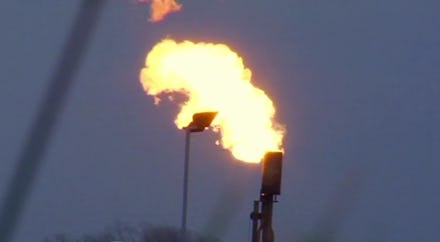Obama Is Negotiating an Agreement That Could Unleash Fracking Around the World

There is a river running through Quebec called the St. Lawrence. It touches New York state as it connects the Great Lakes to the North Atlantic. It carries boats, waters crops and feeds aquifers. It darts out into swimmable lakes and canals, and if it were polluted with toxic chemicals ... it would be a great loss. This is why Quebec placed a moratorium on fracking when American energy company, Lone Pine, decided to frack beneath the river.
Now, the Quebec government is being sued for protecting its citizens and environment over the companies' interests under the North American Free Trade Agreement (NAFTA). It's an illustrative example of what's wrong with some international trade agreements: they effectively reduce regulation by preventing individual nations from enforcing their own rules and regulations.
Scenarios like this one could start playing out all over Europe and the United States if another trade deal, currently being negotiated, goes through. It would be the largest in the world: the transatlantic free trade agreement, knitting together the United States and Europe in a major trade network that could have massive repercussions on our environment (among other things) and lead to a fracking boom.
President Obama is set to meet with top European Union officials in Brussels on Wednesday and it's going to be on their agenda.
To see how important this is, we only need to go back to Quebec and Lone Pine.
Fracking, more formally known as hydraulic fracturing, is a controversial method of recovering natural gas trapped in shale rock deep beneath the earth’s surface. It involves fracturing the stone and pumping billions of gallons of water, sand and toxic chemicals into the earth to force the gas to the surface. There are many health and environmental concerns associated with it.
Quebec’s decision to place a moratorium on fracking could cost the government dearly. Lone Pine invoked some clauses in the NAFTA to sue the Canadian government for $250 million. That’s the dollar figure the company speculates it’s losing as a result of Canada’s decision to prioritize the health of its citizens and of the environment over Lone Pine’s profits.
Lone Pine is basing its suit on investor-state dispute settlement clauses in NAFTA. These clauses are intended to bolster trade and foreign investment. Whether they have any positive economic impact for the every-man is up for debate, but they are terrific for big business. They give corporations leverage to intimidate governments out of regulating in the interest of their constituents. Essentially, these clauses keep governments from doing their job, and they’re very likely packed into the new transatlantic trade agreement, which should be fully negotiated before the end of 2014.
The Transatlantic Free Trade Agreement (TAFTA) is expected to increase trade output by 0.5%, both in Europe and the United States, by "tackling ... behind the border regulatory restrictions," as stated on the European Commission website.
It might use investor-state dispute settlement clauses to bring regulation on both sides of the Atlantic down to what the Seattle to Brussels Network (S2B) describes as "the lowest common denominator."
The ridiculous assumption being made here is that regulations in the United States and Europe are equal. This is nonsense that masks what's really going to happen: a race to the bottom. Europe has much stricter regulation when it comes to environmental standards, food standards, chemical safety, individual privacy and worker's rights. Those pesky "behind the border regulatory restrictions" exist for a reason. This trade agreement would undermine these sorts of hard-fought regulations and open up a large part of the world to greater exploitation without regulation. Fracking would go global.
Our international agreements should focus on protecting the environment though smart regulation, not rolling back existing regulation to make things easier on big business. While Obama is in Brussels this week, let's let him know.